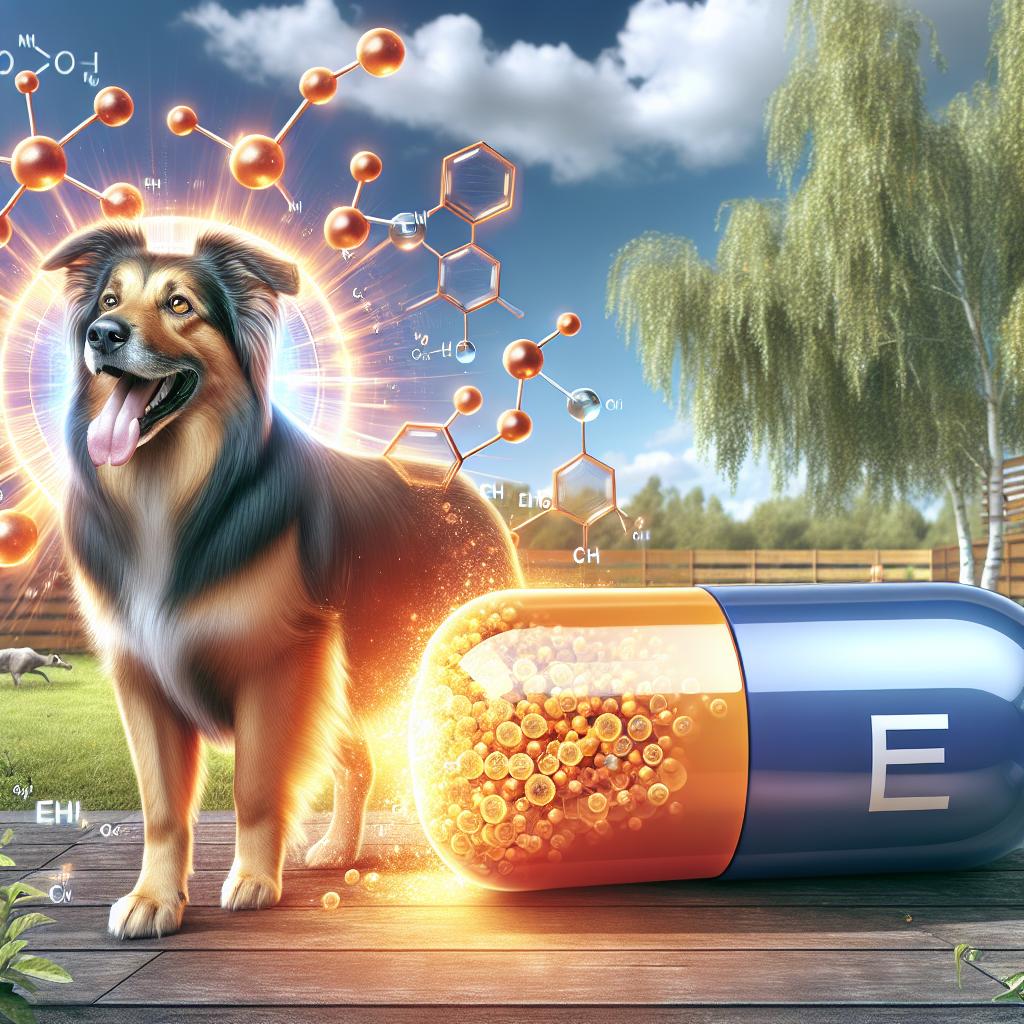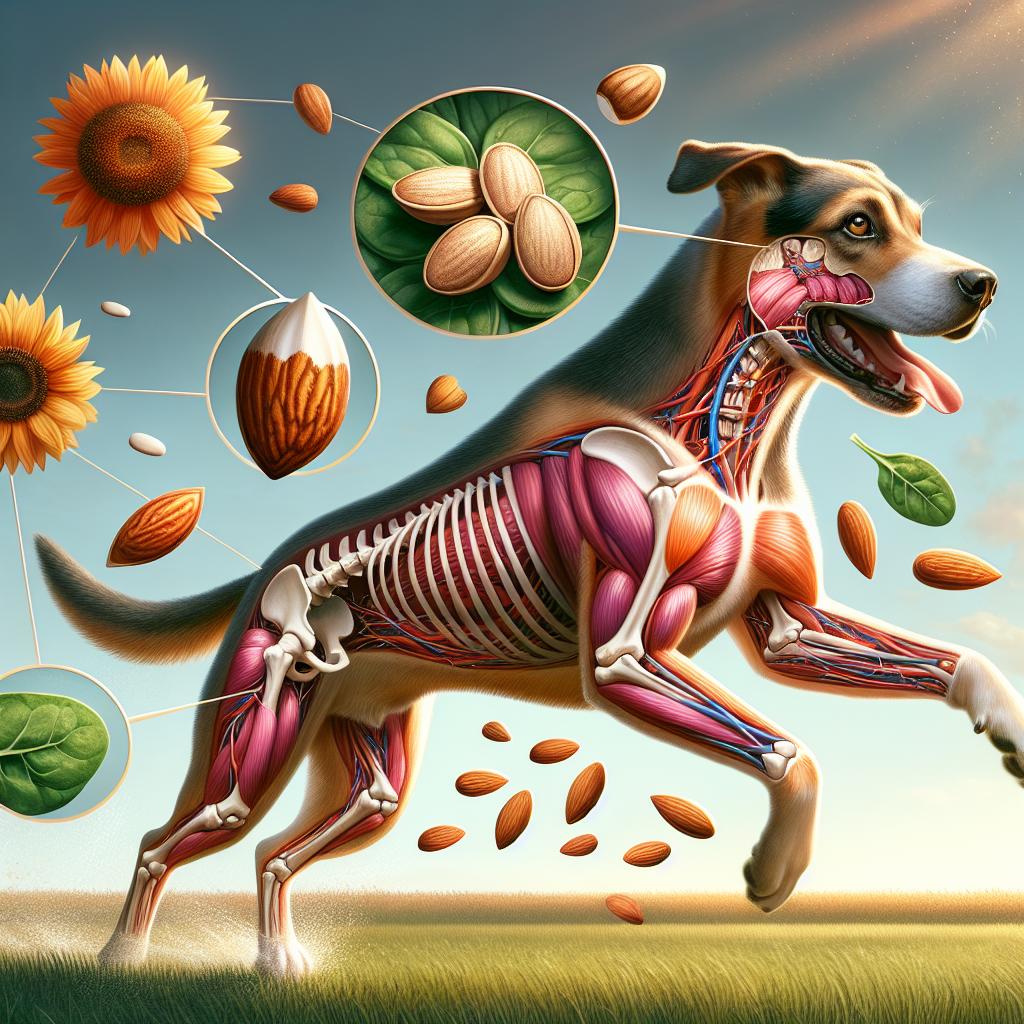The Role of Vitamin E in Your Dog’s Health
As our furry companions prance through life with boundless energy and infectious joy, it’s easy to overlook the intricate tapestry of nutrients that support their well-being. Among these vital elements, Vitamin E stands out as a powerhouse nutrient that plays a crucial role in maintaining your dog’s health. Not just a simple vitamin, it acts as a guardian of cellular integrity, a supporter of a robust immune system, and a partner in the body’s quest for balance. In this article, we will delve into the multifaceted role of Vitamin E in your dog’s health, exploring its benefits, sources, and how it can contribute to a longer, happier life for your beloved pet. Whether your dog is a playful puppy or a wise old companion, understanding the importance of this antioxidant can help you make informed choices for their diet and overall wellness. Join us on this enlightening journey to discover how Vitamin E can be a vital link in enhancing the vibrancy of your dog’s life.
Understanding Vitamin Es Importance for Canine Wellness
Vitamin E plays a crucial role in maintaining your dog’s overall health. This fat-soluble antioxidant helps combat free radicals, protecting vital cells from damage. Adequate levels of Vitamin E support a robust immune system, enhancing your canine companion’s ability to fend off illnesses. Furthermore, it promotes healthy skin and a shiny coat, often reflecting the internal wellness of your pet. Here are some key benefits of Vitamin E for dogs:
- Boosts immune function
- Improves skin health
- Contributes to reproductive health
- Supports muscle health and repair
Incorporating a balanced diet rich in Vitamin E can be achieved through various natural sources. Foods like nuts, seeds, leafy greens, and certain vegetable oils serve as excellent dietary staples to ensure your dog receives this essential nutrient. If you’re considering supplementation, it’s wise to consult with your veterinarian to determine appropriate dosages. The following table summarizes some food sources rich in Vitamin E:
| Food Source | Vitamin E Content (mg per 100g) |
|---|---|
| Almonds | 25.6 |
| Spinach | 2.03 |
| Kiwifruit | 1.46 |
| Wheat Germ Oil | 149.4 |

How Vitamin E Supports Immune Function and Skin Health
Vitamin E is a powerful antioxidant that plays a pivotal role in enhancing your dog’s immune system. By combating oxidative stress, it mitigates the impact of free radicals, thus fortifying immune responses. This nutrient aids in the production of immune cells, which not only helps in warding off infections but also fosters quicker recovery. For optimal immune health, consider incorporating vitamin E-rich foods into your dog’s diet, such as:
- Spinach – A leafy green packed with essential nutrients
- Sweet Potatoes – A tasty treat that offers abundant vitamins
- Fish – Rich in omega fatty acids and vitamin E
- Almonds – A crunchy snack that boosts vitality (ensure they’re unsalted)
In addition to supporting immunity, Vitamin E significantly contributes to your dog’s skin health. It aids in maintaining the skin’s barrier function, helps prevent dryness, and promotes healing of minor abrasions. By incorporating vitamin E into your dog’s skincare regime—whether through topical applications or diet—your furry friend can benefit from a healthier coat and skin. Consider the following sources that can enhance skin health:
| Food Source | Benefit |
|---|---|
| Sunflower Oil | Highly concentrated in vitamin E |
| Peanuts | Supports skin moisture |
| Broccoli | Promotes skin integrity |

Choosing the Right Sources of Vitamin E for Your Dog
When it comes to ensuring your dog gets enough Vitamin E, it’s essential to choose sources that are both natural and easily digestible. Look for whole food sources that not only provide Vitamin E but also come with additional nutrients. Some excellent options to consider include:
- Fish Oils: Rich in Omega-3 fatty acids, these oils often come with Vitamin E, supporting skin health and reducing inflammation.
- Vegetable Oils: Sunflower oil, safflower oil, and wheat germ oil are great additions to your dog’s diet.
- Leafy Greens: Spinach and kale are not only nutritious but also pack a punch when it comes to essential vitamins.
- Nuts and Seeds: Almonds and sunflower seeds can be offered in moderation for a nutrient boost.
In addition to whole food sources, high-quality supplements provide an excellent option if you’re concerned about achieving the desired levels of Vitamin E. When selecting a supplement, look for ones labeled as natural rather than synthetic, as they are more bioavailable and less likely to cause adverse effects. Consider the following when shopping for supplements:
| Feature | Natural Sources | Synthetic Supplements |
|---|---|---|
| Absorption Rate | Higher | Lower |
| Digestibility | Better | Potentially more difficult |
| Side Effects | Minimal | Possible |

Integrating Vitamin E into Your Dogs Diet Safely and Effectively
To incorporate Vitamin E into your dog’s diet, it’s essential to choose safe and effective sources. You can consider using high-quality dog food that includes natural sources of Vitamin E, such as fish, egg yolks, spinach, and nuts. If opting for supplements, always consult your veterinarian beforehand to determine the appropriate dosage based on your dog’s size, breed, and health condition. Ensuring a balanced intake is key, as Vitamin E plays a crucial role in maintaining the immune system and promoting healthy skin and coat.
When introducing Vitamin E, keep an eye on your dog’s overall nutritional balance. It’s vital to mix it into their meal either in liquid form or as part of their regular diet, ensuring it doesn’t exceed the recommended daily allowance. Here are some safe practices to follow:
- Start with small amounts, gradually increasing as needed.
- Monitor for any adverse reactions, such as gastrointestinal upset or allergy symptoms.
- Maintain a consistent feeding schedule to optimize nutrient absorption.
In case of any uncertainties, your vet can guide you in creating an optimal feeding plan tailored to your dog’s unique needs.
Q&A
Q: What is Vitamin E, and why is it important for dogs?
A: Vitamin E is a fat-soluble antioxidant that plays a crucial role in protecting cells from damage caused by free radicals. For dogs, this means that it helps support a healthy immune system, promotes skin and coat health, and contributes to proper brain function. Essentially, Vitamin E acts as a defense mechanism, shielding the body from oxidative stress and ensuring overall well-being.
Q: How can I tell if my dog is getting enough Vitamin E?
A: Signs of Vitamin E deficiency in dogs can include dry skin, flaky or dull coats, muscle weakness, and even reproductive issues. If you notice these symptoms, it’s a good idea to consult your veterinarian. They can assess your dog’s diet and possibly recommend supplements or dietary changes to ensure adequate Vitamin E intake.
Q: What foods are high in Vitamin E that I can include in my dog’s diet?
A: There are several dog-friendly foods rich in Vitamin E. Options include green leafy vegetables like spinach and kale, nuts (in moderation), seeds, fish, and certain vegetable oils such as sunflower oil. Including these foods in your dog’s diet can help boost their Vitamin E levels, but it’s important to do so in moderation and with balance.
Q: Can I give my dog Vitamin E supplements? How do I know the right dosage?
A: While Vitamin E supplements can be beneficial, it’s essential to approach this with caution. Over-supplementation can lead to health issues. It’s always best to consult with your veterinarian before adding any supplements to your dog’s routine. They can recommend the appropriate dosage based on your dog’s weight, age, and specific health needs.
Q: Are there any potential risks associated with giving dogs too much Vitamin E?
A: Yes, while Vitamin E is crucial for health, excessive amounts can lead to problems such as bleeding disorders or gastrointestinal discomfort. Dogs have different nutritional needs, and more is not always better. Keeping your pet within recommended guidelines is essential for their health and safety.
Q: Is Vitamin E more critical for certain types of dogs, such as older dogs or those with health issues?
A: Absolutely! Older dogs or those with specific health concerns, such as skin issues, heart disease, or compromised immune systems, may benefit more from adequate levels of Vitamin E. In such cases, ensuring they receive enough Vitamin E can help manage their conditions and improve their quality of life. However, always consult your vet to tailor dietary choices to their specific needs.
Q: How does Vitamin E contribute to a dog’s skin and coat health?
A: Vitamin E helps maintain the integrity of skin cells and promotes circulation, which can lead to a healthier coat. Its antioxidant properties can also combat itchy, dry skin and promote a shiny, vibrant coat. If your dog seems to be experiencing skin issues, ensuring they get enough Vitamin E might be an effective step towards improvement.
Q: Are there any studies or evidence supporting the benefits of Vitamin E for dogs?
A: Research has demonstrated that Vitamin E supplementation can benefit various aspects of canine health, including skin health, immune function, and even cognitive performance in aging dogs. While more studies are continuously conducted, the existing evidence strongly supports the role of Vitamin E in promoting overall health and wellness in our furry companions.
Q: What should I do if I suspect my dog has a Vitamin E deficiency?
A: If you suspect your dog might be deficient in Vitamin E, the best course of action is to consult your veterinarian. They can perform a thorough examination, possibly recommend dietary analysis, and advise on appropriate adjustments or supplements to ensure your dog receives the nutrients they need to thrive.
To Wrap It Up
the role of vitamin E in your dog’s health is far from a mere footnote in the narrative of their well-being. As a powerful antioxidant, it plays a crucial part in safeguarding their cells, supporting their immune system, and promoting vibrant skin and coat health. By ensuring that your furry friend receives adequate amounts of this essential nutrient—whether through a balanced diet or appropriate supplements—you help lay the groundwork for a longer, healthier life.
Just as we strive to nourish ourselves with the best foods, it’s essential to extend that same dedication to our canine companions. As science continues to unveil the complexities of canine nutrition, vitamin E stands out as a key player in nurturing vitality and resilience. So the next time you reach for that bag of dog food or consider a supplementary treat, remember: a little vitamin E could go a long way in keeping your loyal friend happy and healthy. Here’s to many more tail wags, playful barks, and healthy years together!

